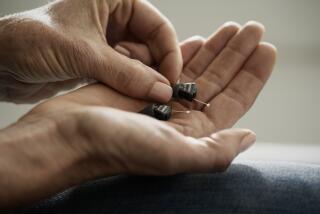Some Deaf Advocates Denounce Ear Implants That Reproduce Sound : Medicine: They contend that being unable to hear is no handicap and oppose âinvasive surgery.â Doctors say theyâre mystified by that view.
ENGLEWOOD, Colo. â Ethics and science are clashing in an increasingly heated debate over a surgically implanted device that restores limited hearing to the deaf.
Cochlear Corp., the manufacturer of the device, says its product is simply a technological alternative to deafness that is not meant for every deaf person.
But deaf advocates say they are incensed by the perception among the hearing and medical communities that any amount of hearing, even if surgery is required to achieve it, is better than none.
Cochlear manufactures cochlear implants, electronic devices that convert sound waves into electrical impulses and transmit them to the inner ear to reproduce sound.
More than 7,000 people, including 2,500 children, have received the implants since they were approved for adults by the U.S. Food and Drug Administration in 1985. The implants were approved in 1990 for children.
The cost of the two-hour implant surgery and follow-up medical care is $25,000 to $30,000.
âItâs time for the public to respect us as deaf people, not as handicapped people,â said Cliff Mores, president of the Colorado Assn. of the Deaf.
âThe handicap is the publicâs perception. Deaf children need not be reminded they are different. With cochlear implants, they will always feel they are different. They are not handicapped or disabled. They are deaf and bright.â
In a position paper on cochlear implants, the National Assn. of the Deaf denounces âinvasive surgery upon defenseless children, when the long-term physical, emotional and social impacts on children from this irreversible procedure--which will alter the lives of these children--have not been scientifically established.â
And advocates for the countryâs half-million deaf people say the FDAâs decision to remove Cochlear Corp.âs implants from the experimental category was based on scientifically and ethically flawed studies and data.
Doctors donât agree with the criticism.
Many ear specialists and surgeons hail the implants as a technological alternative to deafness, especially for young children and late-deafened adults, who can best make sense of the sounds created by the implants.
Laura Moulder, a New York-based spokeswoman for Cochlear Corp., said the implants are intended only for a small percentage of the population.
âThe implants certainly arenât for everyone,â Moulder said. âTheyâre for a small fraction of the population: for children and adults who are profoundly deaf and who cannot be helped by hearing aids.â
Dr. Samuel Selesnick, an assistant professor of otolaryngology and surgeon at New York Hospital Cornell Medical Center, agrees that the implants arenât for every deaf person but that they can help many.
âIf someone is hearing impaired and can wear a hearing aid and do well thereâs really no need for the implant,â he said.
âWhat weâre really trying to do is improve communication to the point to help them read lips and hear most syllables in a conversation. Itâs not like getting a new set of ears,â Selesnick said.
The implant relies on an external microphone, resembling a behind-the-ear hearing aid, which is linked to a pocket-sized speech processor. The processor converts the sounds into electrical impulses transmitted along thin wires that pass through the skull and into the ear.
Inside the ear, each wire stimulates a nerve ending in an organ called the cochlea, where sound waves normally are converted into nerve impulses. As the number of wires increases, so does the number of nerve endings that are stimulated--improving the sound quality.
The devices are surgically implanted in a procedure surgeons liken, in terms of complication and discomfort, to a tonsillectomy.
Deaf advocates say it is cruel to perform surgery on a child to âcorrectâ what the hearing see as a disability. They say that after hundreds of years of living as outcasts in a hearing world, the deaf have developed a culture of their own.
And they say they donât suffer gladly the hearing fools who would have them believe they are somehow missing out on life because they cannot hear.
âThe deaf culture has its own language and its own history, its own culture. The deaf community is a linguistic minority,â said Harlan Lane, distinguished university professor of psychology at Northeastern University and chairman of the National Assn. of the Deafâs task force on childhood cochlear implants.
âItâs not as if kids are dying of their deafness. Itâs part of a larger problem of the way professionals deal with deaf Americans. They treat them as though theyâre hearing people who donât hear. Itâs like treating black people as white people with a skin disease,â he said.
Doctors are also perplexed by the controversy.
âI am befuddled at the reaction of the deaf community to cochlear implants,â said Dr. Karen Jo Doyle, an otolaryngologist at UC-Irvine.
âYou wouldnât expect people who have a handicap to not want others with handicaps to get help. You donât see the blind coming out against surgeries and treatments that help improve vision and you donât see quadriplegics coming out against the new technology in electronic limbs.â
Cochlear defender Selesnick said he understands the deaf advocatesâ point, but he believes the implants are worthwhile.
âTheir point is well taken. But what is the goal (of not using the implants)? To lead an insulated life in the deaf community?â he said. âDeaf people can certainly have full and wholesome lives, but theyâre still not in the community that everyone else is in. Itâs possible to have very good results so people can leave that community and get into the mainstream: mainstream classes, mainstream occupations. A mainstream life.â






